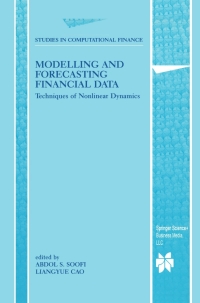Question
1) Which of the following statements is FALSE? a. The total value of the unlevered firm exceeds the value of the firm with leverage due
1) Which of the following statements is FALSE? a. The total value of the unlevered firm exceeds the value of the firm with leverage due to the present value of the tax savings from debt. b. To determine the benefit of leverage for the value of the firm, we must compute the present value of the stream of future interest tax shields the firm will receive. c. By increasing the amount paid to debt holders through interest payments, the amount of the pre-tax cash flows that must be paid as taxes decreases. d. The tax deductibility of interest lowers the effective cost of debt financing for the firm
2) Which of the following statements is FALSE regarding venture capitalist (VC)? a. VC exits through IPO or sale to another company. b. VC performs a key nurturing and monitoring role for the firm. c. VC provides equity financing to mostly mature firms. d. VC funds generally have a life of 10 years.
3) Assume there is corporate tax but no other capital markets frictions. Which of the following statements is FALSE? a. With a recapitalization, even though leverage reduces the total value of equity, shareholders capture the benefits of the debt tax shield up front. b. The share price remains the same after the completion of the recapitalization. c. The existing shareholders will not sell their shares at the initial stock price and demand their share in the debt tax shield benefit. d. When a firm makes a significant change to its capital structure, the transaction is called a recapitalization.
4) Which of the following statements is FALSE? a. Whether paid by the firm or its creditors, the indirect costs of bankruptcy decreases the value of the assets that the firms investors will ultimately receive. b. An important consequence of leverage is the risk of bankruptcy. c. Debt holders ultimately bear the financial distress costs of using leverage. d. Modigliani and Miller's results continue to hold in a perfect market even when debt is risky and the firm may default.
5) Which of the following statements is FALSE about IPO? a. Winners curse is one of the explanations for IPOs underpricing. b. Many IPOs, especially the larger offerings, are managed by a group of underwriters. c. At an IPO, a firm offers a large block of shares for sale to the public for the first time. d. One advantage of going public is the decreased compliance and regulatory costs.
Step by Step Solution
There are 3 Steps involved in it
Step: 1

Get Instant Access to Expert-Tailored Solutions
See step-by-step solutions with expert insights and AI powered tools for academic success
Step: 2

Step: 3

Ace Your Homework with AI
Get the answers you need in no time with our AI-driven, step-by-step assistance
Get Started


